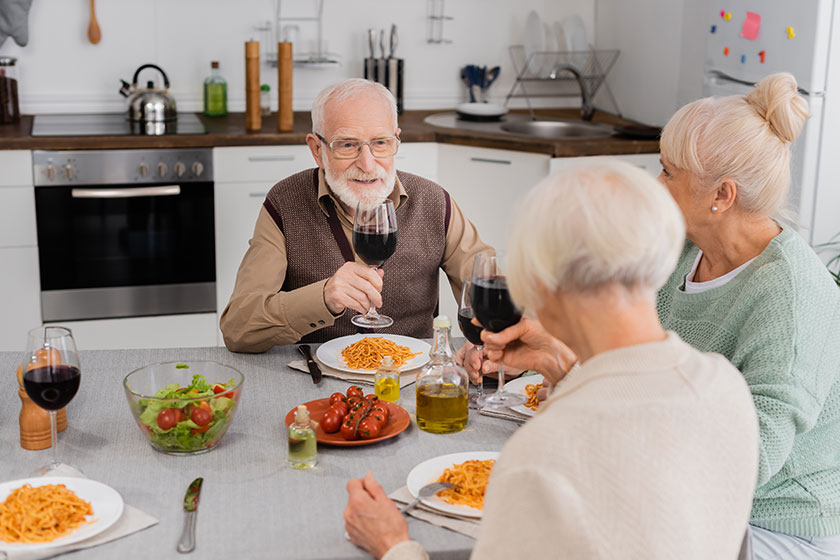For those in their golden years, dining can be a cherished daily ritual. However, when dealing with the challenges of Parkinson’s disease, mealtimes can become a source of frustration and difficulty. This article explores how memory care communities are dedicated to making mealtimes easier and more enjoyable for residents and their families.
Understanding Parkinson’s Disease and Its Impact on Mealtimes
Parkinson’s disease, a progressive neurodegenerative condition, profoundly impacts movement and coordination, presenting a myriad of challenges that directly affect mealtimes for individuals in their golden years. Common symptoms of Parkinson’s include tremors, muscle rigidity, and difficulty in swallowing, collectively posing substantial obstacles to the simple act of eating. For those affected, mealtime can transform into a distressing and frustrating experience, potentially leading to malnutrition and a diminished quality of life.
In the compassionate setting of memory care communities, team members receive specialized training to comprehend the nuanced needs of residents battling Parkinson’s. This training encompasses a profound understanding of the disease’s physical and emotional toll, enabling caregivers to offer tailored support and assistance during mealtimes. By addressing the unique challenges posed by Parkinson’s, memory care communities strive to transform each meal into a comfortable and dignified experience, ensuring that residents can savor their food with a sense of ease and independence, ultimately contributing to their overall well-being.
Tailored Dining Spaces and Assistive Technologies
The thoughtful design of dining spaces is a fundamental aspect of memory care communities, and it plays a pivotal role in enhancing the dining experience for residents living with Parkinson’s. These spaces are meticulously planned and executed to address the unique and diverse needs of individuals in their golden years.
Tables and chairs within these dining areas are strategically positioned to ensure easy access and support for those with mobility challenges, including the tremors and muscle stiffness often associated with Parkinson’s disease. This arrangement promotes independence, allowing residents to navigate the dining space comfortably and without unnecessary obstacles.
Specialized Meal Plans and Nutritional Support
Proper nutrition is a cornerstone of well-being, particularly for individuals in their golden years, and this significance amplifies for those grappling with Parkinson’s disease. Memory care communities are acutely aware of the critical role nutrition plays in maintaining health and quality of life. To address this, they employ professional dietitians and skilled chefs who collaborate to develop meal plans tailored specifically to the dietary needs of residents living with Parkinson’s disease.
These specialized meal plans are meticulously crafted, considering factors like reduced appetite, potential interactions with medications, and the challenges associated with swallowing that Parkinson’s can bring. The goal is to provide residents with nourishment that not only sustains their health but also enhances their vitality and overall well-being.
Trained Caregivers and Personalized Assistance
In memory care communities, residents with Parkinson’s benefit from the expertise of dedicated and highly trained team members who possess a deep understanding of the nuances of the disease. These caregivers are adept at delivering personalized assistance during mealtimes, which goes beyond the ordinary. They skillfully aid residents by assisting with tasks like cutting food, guiding utensils to their mouths, and vigilantly monitoring for any indications of discomfort or choking. This elevated level of individualized care is meticulously designed to ensure that your loved ones can savor their meals with the utmost dignity and peace of mind.
Fostering Social Connection and Enjoyable Dining Experiences
Mealtimes in memory care communities are not just about nourishment; they are also opportunities for social interaction and enjoyment. These communities recognize the importance of companionship and encourage residents to dine together in a communal setting. Dining becomes a social event where residents can share stories, laughter, and good food with their peers. This sense of community not only enhances the dining experience but also contributes to the overall quality of life for those in their golden years.
Memory care communities play a pivotal role in making mealtimes easier and more enjoyable for those in their golden years living with Parkinson’s disease. Through tailored dining spaces, specialized meal plans, and compassionate caregivers, these communities provide the support needed to maintain independence and dignity during mealtime. Additionally, the focus on social connection ensures that dining remains a cherished part of daily life. If you’re seeking a memory care community that prioritizes the well-being of your loved ones, consider exploring Morada Lake Arlington, where residents receive the highest level of care and support for a fulfilling retirement experience.






